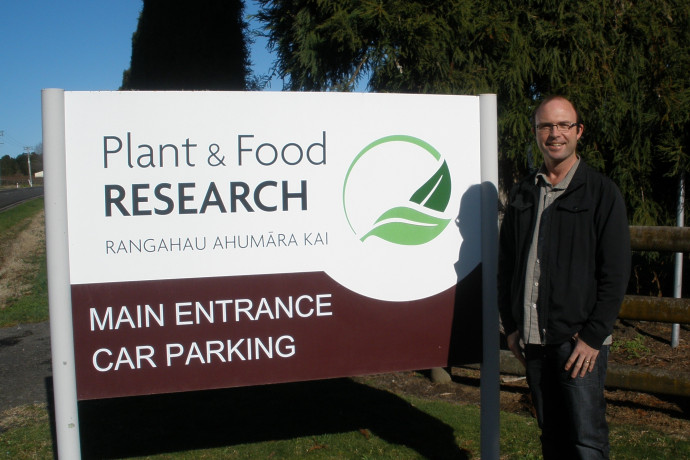Tauranga Girls’ College - Richard Hendra

2015 | Kiwifruit resource partitioning effects on PSA
School: Tauranga Girls’ College
Host: The New Zealand Institute of Plant and Food Research – Te Puke
Region: Bay of Plenty
Richard has been a secondary school Science and Biology teacher for the past 15 years, working initially in Auckland and then moving to the sunny Bay of Plenty where he is Teacher in Charge of Biology at Tauranga Girls’ College.
Richard has been hosted by Plant and Food – a crown research institute based in Te Puke and has had the opportunity to work alongside a range of staff in the Plant Physiology department, including Dr. Peter Minchin, Dr. Nick Gould and Nikki Haisman. Over the last two terms, Richard has worked mainly on kiwifruit and avocado – two of the main horticultural crops in the Bay of Plenty.
The bacterial kiwifruit vine disease PSA was first detected in the Bay of Plenty in 2010 and is an economic threat to the industry. His work with kiwifruit has involved investigating aspects of water transport in vines grafted onto a range of rootstocks. This has included regular sampling of xylem fluid via taps drilled into the vines, setting up electronic data loggers to measure the pressure of the xylem and involvement in processing this data.
The second focus of his placement has been working on avocado and the factors that affect successful fruit set. Avocado trees can flower profusely but usually only a very small proportion of the flowers develop into fruit for harvest. They can also produce heavy crops one year and then a lot less fruit the following. A range of environmental factors have been implicated in these patterns including water availability and overnight temperatures. Richard had assisted with setting up experiments to investigate these factors including collecting ovules from flowers, sampling phloem and tagging flowers.
Other areas of work he has had the opportunity to be involved in include radioactive 14C labeling of potato plants to investigate the impact of bacterial infection and some preliminary work on phloem sampling of plants using aphids and other phloem feeders.
Over this time, Richard has gained familiarity with an industry that is vital to the local region and seen how science is carried out in both field and laboratory settings. With this knowledge and experience, Richard has gained a better understanding of the Nature of Science, and how this works both in research and also in a commercial setting.
Richard would like to thank his school, Tauranga Girls’ College, and colleagues in the Science department for supporting his application to take part in this programme, his host organisation Plant and Food, the staff he has worked alongside (in particular Dr. Peter Minchin, Dr. Nick Gould and Nikki Haisman), the Royal Society of New Zealand for administering the programme and Ministry of Business, Innovation and Employment for providing the funding.
